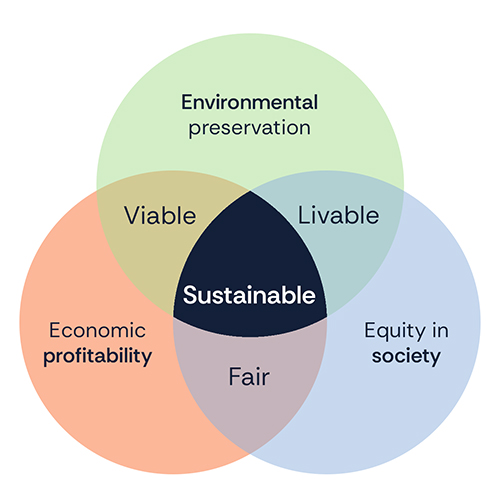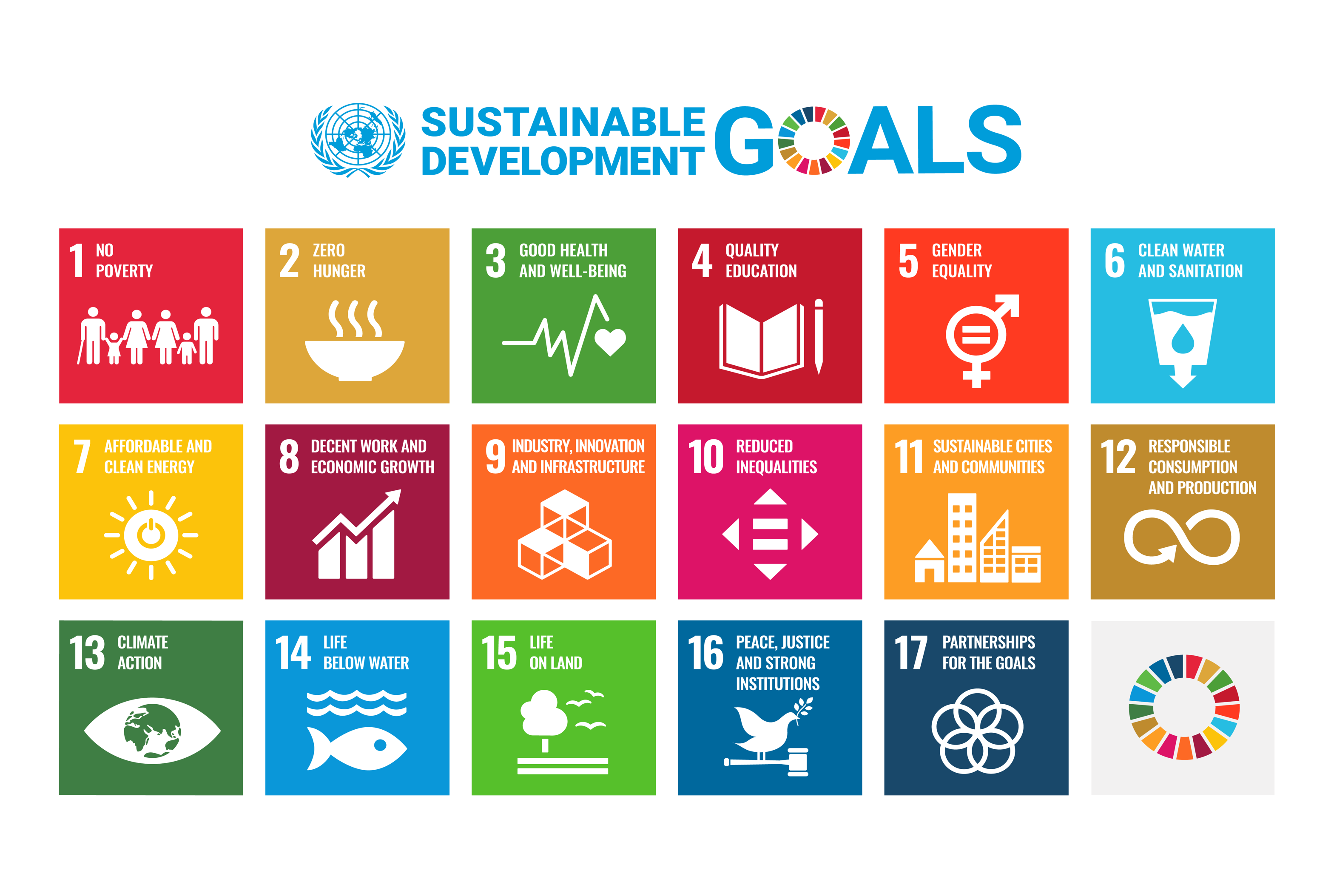Since its creation, Afnic has placed sustainable development at the core of its activity
Our objective is to combine technical, economic, social and environmental performances in the service of the general interest.
As a major actor in the French digital ecosystem, we are well aware of the impact of our activities and of the significant role we have to play for society as a whole and in terms of how practices evolve.
Afnic has incorporated Corporate Social Responsibility (CSR) into its governance, in cooperation with all Internet stakeholders in France (public authorities, users and the private sector), and its mission for over 25 years as a means of improving its activities and its results. CSR is an important component of our activities and an integral part of our 2023-2025 strategy. We advocate integrity, openness, professionalism and a collective approach to promoting an Internet made in France that benefits everyone.
Our CSR policy encompasses strong commitments regarding the well-being of our employees, the fight against online abuse, the security of data and our services, building awareness of use of the Internet, and the decarbonisation of our activities to ensure that the Internet domains that we manage are responsible domains.
- Provide our employees with a healthy, safe and pleasant working environment that fosters their professional development
- Develop stakeholder relationships based on trust and co-construction
- Respect and protect the rights of domain name users
- Be a committed actor in the service of the general interest, VSEs/SMEs, young people and people with little or no experience of the digital world
- Innovate by integrating CSR issues to design responsible products and services
- Measure the carbon impact of our activities and reduce the footprint of the domain name business
| 2024 | 2025 | |
|---|---|---|
|
|
|
|
|
|
| Governance |
|
|
Our CSR Reports
Social Responsibility, an adaptation of corporate sustainabilityle
The concept of sustainable development first emerged in 1987 in a report by the UN World Commission on Environment and Development, known as the Brundtland Report: “Sustainable development is development that meets the needs of the present without compromising the ability of future generations to meet their own needs.”
This notion subsequently gained ground following growing awareness since the 1970s of the ecological finiteness of the Earth and the study on the crossing of planetary boundaries.
Action needs to be taken in three areas simultaneously to avoid the depletion of resources: environment, society and the economy.
According to the European Commission, Corporate Social Responsibility (CSR) is “a concept whereby companies integrate social and environmental concerns in their business operations and in their interaction with their stakeholders on a voluntary basis”.
CSR is therefore the implementation of sustainable development goals by businesses, in other words seeking to have a positive impact on society while at the same time being economically viable.

CSR: A Cross-Functional Approach Shaping Afnic's Strategic Vision
The teams and members of Afnic share a common vision of the internet and our role as an essential infrastructure operator, focused on serving the public interest and inspired by the pillars of Corporate Social Responsibility (CSR).
Afnic’s strategic vision encapsulates the operational priorities of our association. Organized around three main areas, it aims to guide the organization’s activities and achievements over a three-year period.
For the 2023–2025 period, the three strategic priorities are as follows:
- Strengthen Afnic’s position as a leader in DNS and domain names in France and Europe;
- Maintain the .fr domain as the most dynamic extension in its market, with a focus on supporting SMEs and micro-businesses;
- Be a recognized and valuable actor in digital solidarity and sustainable digital practices.
These strategic priorities are rooted in our overarching vision: to “leverage internet naming systems and their values of openness and cooperation to support the autonomy of users, foster innovation, mitigate risks, and promote the sustainability of digital technologies.”
Indeed, within the vast landscape of digital actors and technologies, domain names—and specifically the .fr ccTLD—hold a unique position. The .fr domain is a digital public good: it belongs to all its users, is managed transparently with input from all stakeholders, and its benefits are reinvested into the French internet community through Afnic’s commitments to digital solidarity and research funding.
The more the .fr domain—and the DNS protocol, as an open and transparent standard—are supported and recognized in France and Europe, the stronger the alignment with their core values. These values are reflected in Afnic’s governance model, its commitment to transparency, and the empowerment of users to maintain control over their online presence—a capability Afnic actively helps them preserve.
Finally, the .fr domain is a responsible extension. It has implemented anti-abuse procedures to protect everyone’s rights, strives to reduce its carbon footprint, finances research on carbon reduction and the environmental impact of DNS, and, through its foundation, supports digital solidarity projects. These initiatives ensure the internet serves as a fertile ground for opportunity rather than a source of division and exclusion.
The UN’s 17 Sustainable Development Goals
The 2030 Agenda, adopted in 2015 by the 193 Member States of the UN, provides a framework of universal and transformative goals that apply to all countries.
Comprised of 17 Sustainable Development Goals (SDGs) and 169 targets, it lays out a roadmap that covers all societal issues to render the initiatives of all actors and citizens of the signatory states more sustainable. The SDGs are interdependent. They must be attained collectively and implemented by all countries. A monitoring mechanism is in place, and each country must declare its progress every year.

Global greenhouse gas (GHG) reduction targets
The Paris Agreement, an international treaty on climate change, was also adopted in 2015 at the UN Paris Climate Conference (Cop 21). Its overriding objective is to hold “the increase in the global average temperature to well below 2°C above pre-industrial levels” and pursue efforts “to limit the temperature increase to 1.5°C above pre-industrial levels” in order to limit the effects of climate change.
In concrete terms this means:
- Reducing GHG emissions by 43% between 2019 and 2030 (i.e. -3.91% per year)
- Reaching “net-zero” emissions in 2050 = balance between CO2e emitted and CO2e sequestered.
Each signatory of the Paris Agreement (174 States and the European Union) has an obligation to submit a Nationally Determined Contribution (NDC) updated every five years. NDCs are climate action plans that aim to reduce CO2e emissions and adapt to the effects of climate change.
A version for Europe…
The European Commission initially set the target “to reduce net greenhouse gas emissions by at least 55% relative to 1990”. A more ambitious target than the Paris Agreement given that it requires a 5% reduction per year.
This target has been transposed into the ‘Fit for 55’ package: a set of 12 legislative proposals published by the European Commission on 14 July 2021 setting out concrete actions to achieve the target. The Fit for 55 texts were revised in 2022 and 2023 and should ultimately allow for a 57% reduction in EU net GHG emissions as of 2030.
… and France
Introduced by the Law on Energy Transition for Green Growth of 17 August 2015, the National Low Carbon Strategy (Stratégie Nationale Bas-Carbone, SNBC) is the French roadmap to combat climate change. It sets the guidelines for implementing the transition to a low-carbon, circular and sustainable economy in all sectors of activity. It sets greenhouse gas (GHG) emissions reduction targets up to 2050 and carbon budgets (emissions caps not to be exceeded) by period and major sectors. Its goal is twofold: achieving carbon neutrality by 2050 and reducing the French people’s carbon footprint.
- Between 2015 and 2030: France is committed to reducing its annual emissions by 40%, i.e. 9.9 MtCO2e/year.
- Between 2030 and 2050: to reach net-zero emissions, France will reduce its emissions by 11.5 MtCO2e/year.
- The remaining annual 80 MtCO2e will be absorbed by GHG sinks.
Environment: measuring, understanding and reducing the impact of our activities
We conducted our first carbon footprint assessments and established a plan to reduce our greenhouse gas emissions as of ...
Our social commitments
Our ambitious HR policy fosters employee satisfaction and skills development
Governance that guarantees that we achieve our goals
Use Internet naming and its values of openness and cooperation to develop user autonomy, innovation, risk management ...